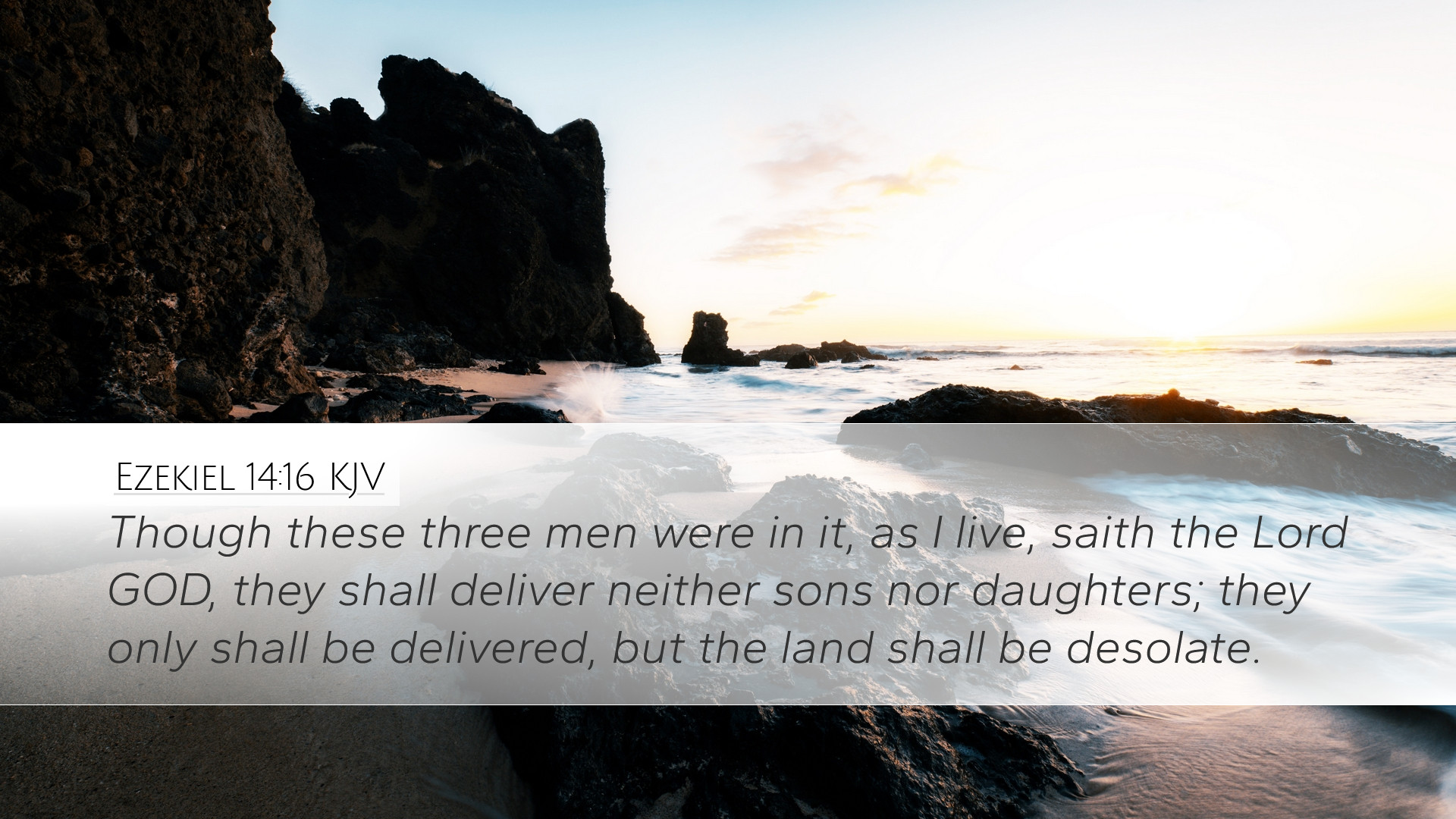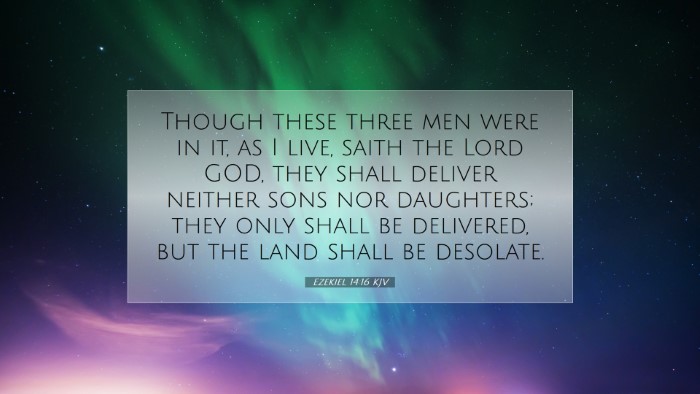Ezekiel 14:16 - Commentary
The Verse: "Though these three men, Noah, Daniel, and Job, were in it, they should deliver but their own souls by their righteousness, saith the Lord GOD." (Ezekiel 14:16)
Introduction
This verse appears in a larger context where God is speaking through the prophet Ezekiel regarding the impending judgment on Jerusalem. The mention of notable figures such as Noah, Daniel, and Job serves a profound purpose by illustrating the personal nature of righteousness and the limitations of intercession based solely on the merits of the righteous.
Contextual Background
Ezekiel's message was addressed during a time of great turmoil and judgment for Israel. The leaders and people of Jerusalem are depicted as rebellious, seeking false security in their rituals and traditions. The presence of righteous men, even the most exemplary such as Noah or Daniel, does not shield the community as a whole from God's judgment. This serves as a powerful reminder of personal accountability before God.
Insights from Commentators
Matthew Henry's Commentary
Matthew Henry emphasizes the principle of individual responsibility. He outlines that despite the righteousness of Noah, Daniel, and Job, their presence cannot save others if the people remain unrepentant.
- Noah: Known for his faithfulness in a corrupt generation; his obedience did not spare his contemporaries from judgment.
- Daniel: Noted for his exceptional character and wisdom; his intercessions for Israel were profound, yet the collective sin of the people brought inevitable consequences.
- Job: A model of patience and integrity, his sufferings showcase a profound personal faith, but again, his righteousness was personal and could not avert communal judgement.
Henry calls attention to the fact that personal righteousness can ripple outward in its influence, yet ultimately, the individual must stand before God in their own merit. The text teaches that salvation is not inherited or transferable; rather, it is a personal matter.
Albert Barnes' Notes on the Bible
Barnes adds depth to this concept of individual righteousness. He points out that while these three figures are exemplary representatives of unwavering faith, their influence does not extend to others when those others actively reject God. He explains:
- The significance of the names mentioned illustrates God's acknowledgment of righteousness amidst a corrupt society.
- Those who remain in sin should not expect to be rescued simply based on the merits of others.
- This highlights the justice of God in dealing with individuals according to their own actions and choices.
Furthermore, Barnes notes that God's justice operates on principles that cannot be compromised; despite the virtues of these men, their righteous acts could not atone for the collective sins of a nation.
Adam Clarke's Commentary
Clarke provides a theological reflection on the implications of the verse in relation to the character of God and the nature of sin. He argues:
- The majesty of God's justice: God cannot be swayed by mere appearances; He demands true repentance and a change of heart.
- The futility of relying on the righteousness of others: This scripture warns against complacency and false security based on the spiritual state of others.
- Historical examples serve as a warning: The fates of Noah, Daniel, and Job showcase the lasting principles of God's governance in human affairs.
Clarke emphasizes the necessity of personal integrity and the need for an individual relationship with God, where deeds and motivations are scrutinized.
Theological Implications
This verse has profound theological implications, particularly in relation to the doctrines of personal salvation and accountability. It raises essential questions:
- What does it mean to be righteous in a corrupt society?
- How do examples of faith from the past speak into present realities?
- To what extent can intercession be effective for those who refuse to repent?
For pastors and theologians, the verse challenges the notion of communal righteousness versus individual accountability. It calls into question efforts to leverage the reputation of saints in conversations about salvation and judgment.
Conclusion
Ezekiel 14:16 stands as a stark reminder that faith and righteousness are essentially individual matters. The great figures of faith serve as examples of what it means to walk with God, yet their legacy is one of personal relationship rather than communal salvation. As one delves deeper into this text, it becomes clear that individual accountability to God is the ultimate reality each believer must face.
This teaching serves both as an encouragement towards personal piety and as a warning against the assumption that inheriting righteousness from others can absolve one from the consequences of sin. In these days of moral decay, such lessons from scripture are ever more relevant.


